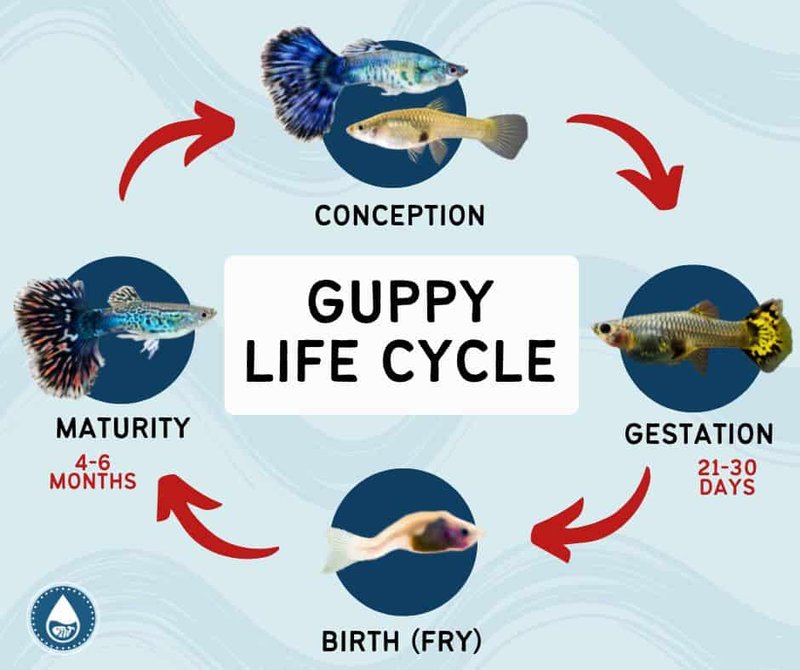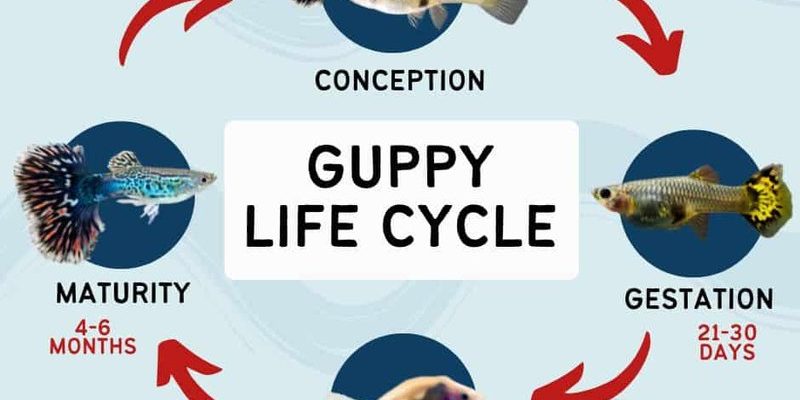
Now, imagine your guppy as a little swimmer in a race. The way you take care of it can impact how long it stays in the race. In this article, we’ll explore everything about guppy lifespan in captivity, so you can ensure your aquatic friend swims happily for as long as possible.
Understanding the Lifespan of Guppies
So, how long do guppies live? In captivity, guppies typically live anywhere from 2 to 5 years. Yeah, it’s not an eternity, but there’s a lot more to it. The lifespan can hinge on various factors, much like how an athlete performs better with a good coach and a great environment.
Guppies are known for being hardy little fish, but their longevity depends on several elements like water quality, diet, and even stress levels. Imagine living in a cozy, clean house versus a cramped, messy one—it makes a big difference, right? In a well-maintained tank, guppies thrive, whereas in poor conditions, their lifespan could be cut short.
Here’s the thing: if you’re thinking of getting guppies, knowing their lifespan helps you plan for their care and companionship. They may not be here forever, but with the right knowledge, you can make those years count!
Factors Affecting Guppy Lifespan
When it comes to guppy lifespan, several factors play a role. Let’s break them down, so you can see what influences how long your little swimmer can stick around.
Water Quality
Water quality is crucial—think of it as your guppy’s home environment. If the water is clean, well-filtered, and free of harmful chemicals, your guppy is much more likely to live a longer, healthier life. Regularly testing the pH, ammonia, and nitrate levels can keep the water in check.
Dirty water is like living in a cluttered mess; it causes stress and illness. Make sure to do regular water changes, around 25% every week, to keep things fresh. A good filtration system can also make a huge difference, clearing out toxins and unwanted debris.
Diet and Nutrition
What your guppy eats significantly impacts its lifespan. A varied diet including high-quality fish flakes, frozen foods like brine shrimp, and occasional treats like blanched vegetables can provide the nutrients needed for growth and vitality. Think of it as a balanced diet for humans; everyone feels better and lives longer when getting the right mix of foods.
Avoid overfeeding! It’s like giving a kid all the candy they want; it might be fun for a short time, but it’s not healthy in the long run. Feed your guppy no more than it can consume in a few minutes, once or twice a day.
Stress Levels
Stress is a sneaky little monster that can shorten your guppy’s life. Factors such as overcrowding, aggressive tank mates, or sudden changes in water temperature can create a stressful environment. Imagine being stuck at a party where no one gets along; it wouldn’t be fun for anyone!
To reduce stress, ensure your aquarium is appropriately sized and that your guppy has plenty of hiding spots. Also, try to introduce new fish gradually to avoid chaos in the tank. A peaceful environment can help your guppy flourish and live longer.
Common Health Problems
Even in the best conditions, guppies can face health challenges. Being aware of common problems can help you take action quickly. Let’s look at a few of them.
Ich and Fin Rot
Two common illnesses in guppies are Ich and fin rot. Ich is a parasitic infection that appears as white spots on the fish’s body. It’s like having a cold; it spreads easily but can be treated with medication and heat adjustments in the tank.
Fin rot, on the other hand, results from poor water quality or injury. The fins will appear ragged or frayed. Keeping the water clean and observing your fish can help prevent this nasty condition.
Breeding and Stress on Female Guppies
Did you know female guppies can get stressed from breeding? It’s true! They can give birth to dozens of fry (baby fish) at once, which can be exhausting. This stress can shorten their lifespan, so you might want to consider separating males and females if you notice any signs of distress.
By paying attention to their health and taking action when needed, you can help your guppies live their best lives.
How to Extend Your Guppy’s Lifespan
Now that you know what affects guppy lifespan, let’s look at simple steps you can take to help them live longer.
Regular Water Changes
Routine water changes help keep your guppy’s environment clean. As mentioned earlier, aim for 25% changes weekly. This reduces harmful toxins and keeps the water fresh.
Quality Nutrition
Feed your guppies a mix of high-quality foods and occasional treats. This ensures they get the proper nutrients and keeps them happy and healthy. Consider adding some live plants to their tank as well; they can nibble on them and find hiding places.
Monitor Tank Conditions
Check the water parameters regularly to ensure the right temperature (around 75-82°F), pH level (around 6.8-7.8), and ammonia levels (which should be at zero). Keep an eye out for any changes in behavior or appearance that could signal illness.
Avoid Overcrowding
Cramming too many fish into a tank can lead to stress and heightened aggression. It’s important to provide adequate space—about 1 gallon of water per inch of fish is a good rule of thumb. This way, they can swim freely and happily.
So, how long do guppies live? The answer is anywhere from 2 to 5 years, depending on various factors like water quality, diet, and stress levels. By keeping an eye on these elements and providing the best care possible, you can help your guppies thrive for as long as their little hearts desire.
In the end, keeping guppies is a rewarding experience. You get to enjoy their vibrant colors and playful nature, all while learning about their needs and health. It’s like having a little piece of the ocean right in your living room. So, dive in, enjoy the journey, and keep those guppies swimming happily!

